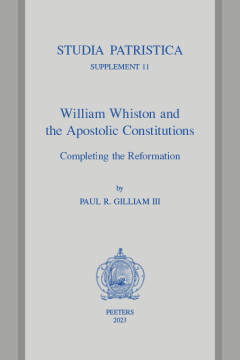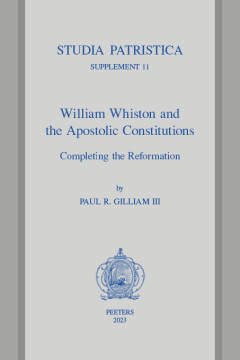
- Retrait gratuit dans votre magasin Club
- 7.000.000 titres dans notre catalogue
- Payer en toute sécurité
- Toujours un magasin près de chez vous
- Retrait gratuit dans votre magasin Club
- 7.000.0000 titres dans notre catalogue
- Payer en toute sécurité
- Toujours un magasin près de chez vous
68,00 €
+ 136 points
Description
Written in the wake of Maurice Wiles' Archetypal Heresy: Arianism through the Centuries, this book narrates the gripping account of William Whiston's outsized affections for the Apostolic Constitutions. The Apostolic Constitutions, a collection of teachings concerning issues such as baptism, the eucharist, proper gender relations, and the ordination of bishops claim to have been given by the resurrected Jesus to his apostles during the forty days before his ascension back into the presence of God. In addition, the Apostolic Constitutions claim to have been gathered by Clement, understood to be the companion of the apostle Paul. Most scholars from Whiston's seventeenth- and eighteenth-century world concluded that the Apostolic Constitutions was not, in fact, apostolical, no matter its claims. The consensus today, perhaps unanimous even, is of a similar nature: the Apostolic Constitutions consists of church orders emerging from the second and third centuries that were then assembled sometime during the fourth century when the apostles' names, along with first-person pronouns, were added. William Whiston, however, concluded that the Apostolic Constitutions was the most sacred book of the New Testament. How then did William Whiston who, as the successor to Sir Isaac Newton as the Cambridge University Lucasian Professor of Mathematics, was a member of the intelligentsia of his day, come to such a conclusion? The pages of this book will answer this question. As the narrative unfolds it will become apparent that even though Whiston was wrong about the apostolicity of the Apostolic Constitutions, he nevertheless made important contributions to patristic scholarship as well as, and perhaps most important, religious liberty for all persons. Furthermore, even though Whiston was mistaken about the centerpiece of his project to restore primitive Christianity, some readers will appreciate his sincere desire to bring the reformation work of Martin Luther and others to completion.
Spécifications
Parties prenantes
- Auteur(s) :
- Editeur:
Contenu
- Nombre de pages :
- 195
- Langue:
- Anglais
- Collection :
- Tome:
- n° 11
Caractéristiques
- EAN:
- 9789042947283
- Date de parution :
- 11-04-23
- Format:
- Livre broché
- Format numérique:
- Trade paperback (VS)
- Dimensions :
- 160 mm x 240 mm
- Poids :
- 589 g

Les avis
Nous publions uniquement les avis qui respectent les conditions requises. Consultez nos conditions pour les avis.






